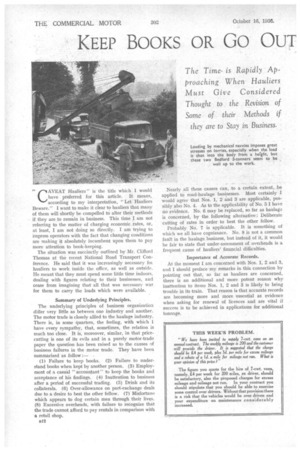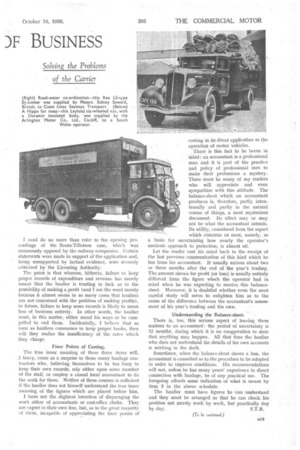KEEP BOOKS OR GO OUT DE' BUSINESS
Page 46

Page 47

If you've noticed an error in this article please click here to report it so we can fix it.
The Timeis Rapidly Ap, proaching When Hauliers Must Give Considered Thought to the Revision of Some of their Methods if
they are to Stay in Business.
" AVEAT Hauliers" is the title which I would have preferred for this article. It means,
according to my interpretation, "Let Hauliers Beware." I want to make it clear to hauliers that many of them will shortly be compelled to alter their methods if they are to remain in business. This time I am not referring to the matter of charging economic rates, or, at least, I am not doing so directly. I am trying to impress operators with the fact that changing conditions are making it absolutely incumbent upon them to pay more attention to book-keeping.
The situation was succinctly outlined by Mr. Clifford Thomas at the recent National Road Transport Conference. He said that it was increasingly necessary fot hauliers to work inside the office, as well as outside. He meant that they must spend some little time indoors, dealing with figures relating to their businesses, and cease from imagining that all that was necessary was for them to carry the loads which were available.
Summary of Underlying Principles.
The underlying principles of business organization differ very little as between one industry and another. The motor trade is closely allied to the haulage industry. There is, in some quarters, the feeling, with which I have every sympathy, that, sometimes, the relation is much too close. It is, moreover, similar, in that pricecutting is one of its evils and in a purely motor-trade paper the question has been raised as to the causes of business failures in the motor trade. They have been summarized as follow :— .
(1) Failure to keep books. (2) Failure to understand books when kept by another person. (3) Employment of a casual " accountant " to keep the books and acceptance of his findings. (4) Inattention to business after a period of successful trading. (5) Drink and its collaterals. (6) Over-allowance on part-exchange deals due to a desire to best the other fellow. (7) Misfortune which appears to dog certain men through their lives. (8) Excessive overheads, with failure to recognize that the trade cannot afford to pay rentals in comparison with a retail shop.
s12
Nearly all these causes can, to a certain extent, be applied to road-haulage businesses. Most certainly I would agree that Nos. I, 2 and 3 are applicable, poSsibly also No. 4: As to the applicability of No. 5 I have no evidence. No. 6 may be replaced, so far as haulag3 is concerned, by the following alternative: Deliberate cutting of rates in order to best the other fellow.
Probably No.. 7 is applicable. It is something of which we all have cognizance. No. 8 is not a common fault in the haulage business, but instead of it, it would be fair to state that under-assessment of overheads is a frequent cause of hauliers' financial difficulties.
Importance of Accurate Records.
At the moment I am concerned with Nos. 1, 2 and 3, and I should preface my remarks in this connection by pointing out that, so far as hauliers are concerned, there is an additional and more potent reason why inattention to items Nos. 1, 2 and 3 is likely to bring trouble in its train. That reason is that accurate records are becoming more and more lessential as evidence when asking for renewal of licences and are vital if success is to be achieved in applications for additional tonnage. I need do no more than refer to the opening proceedings of the Bouts-Tillotson case, which was strenuously opposed by the railway companies. Certain statements were made in support of the application and, being unsupported by factual evidence, were severely criticized by the Licensing Authority.
The point is that whereas, hitherto, failure to keep proper records of expenditure and revenue has merely meant that the haulier is trusting to luck as to the possibility of making a profit (and I use the word merely because it almost seems in so many cases that hauliers are not concerned with the problem of making profits), in future, failure to keep some records is likely to mean loss of business entirely. In other words, the haulier must, in this matter, either mend his ways or be compelled to end them. Incidentally, I believe that so soon as hauliers .commence to keep proper books, then will they realize the insufficiency of the rates which they charge.
Finer Points of Costing.
The true inner meaning of these three items will, .1 fancy, come as a surprise to those many haulage contractors who, believing themselves to be too busy to keep their own records, rely either upon some member of the staff, or employ acasual local accountant to do the work for them. Neither of these courses is sufficient if the haulier does not himself understand the true inner meaning of the figures which are . placed before him.
I have not the slightest intention of disparaging the work either of accountants or cost-office clerks. They are expert in their own line, but, as to the great majority of them, incapable of appreciating the finer points of
costing in its direct application to the operation of motor vehicles.
There is this fact to be borne in mind : an accountant is a professional man and it is part of the practice and policy of professional men to make their profeskons a mystery. There must be many of my readers who will appreciate and even sympathize with this attitude. The balance-sheet which an accountant produces is, therefore, partly intentionally and partly in the natural course of things, a most mysterious document. Its effect may or may not be what the accountant intends. Its utility, considered from the aspect which concerns us most, namely, as a basis for ascertaining how nearly the operator's methods approach to perfection, is almost nil.
Let the reader cast his mind back to the receipt of the last previous communication of this kind which he has from his accountant. It usually arrives about two or three months after the end of the year's trading. The amount shown for profit (or loss) is usually entirely different from the figure which the operator had in mind when he was expecting to receive this .balancesheet. Moreover, it is doubtful whether even the most careful study will serve to enlighten him as to the cause of the difference between the accountant's assessment of his year's trading and his own.
Understanding the Balance-sheet.
There is, too, this serious aspect of leaving these matters to an accountant : the period of uncertainty is 12 months, during which it is no exaggeration to state that anything may happen. All that time the haulier who does not understand the details of his own accounts is working in the dark.
Sometimes, when the balance-sheet shows a loss, the accountant is consulted as to the procedure to be adopted in order to improve conditions. His recommendations will not, unless he has many years' experience in direct connection with haulage, be of any practical use. The foregoing affords some indication of what is meant by item 3 in the above schedule.
The haulier must have figures he can -understand and they must be arranged so that he can cheek his position not merely week by week, but practically day
by day. S.T.R.








































































































